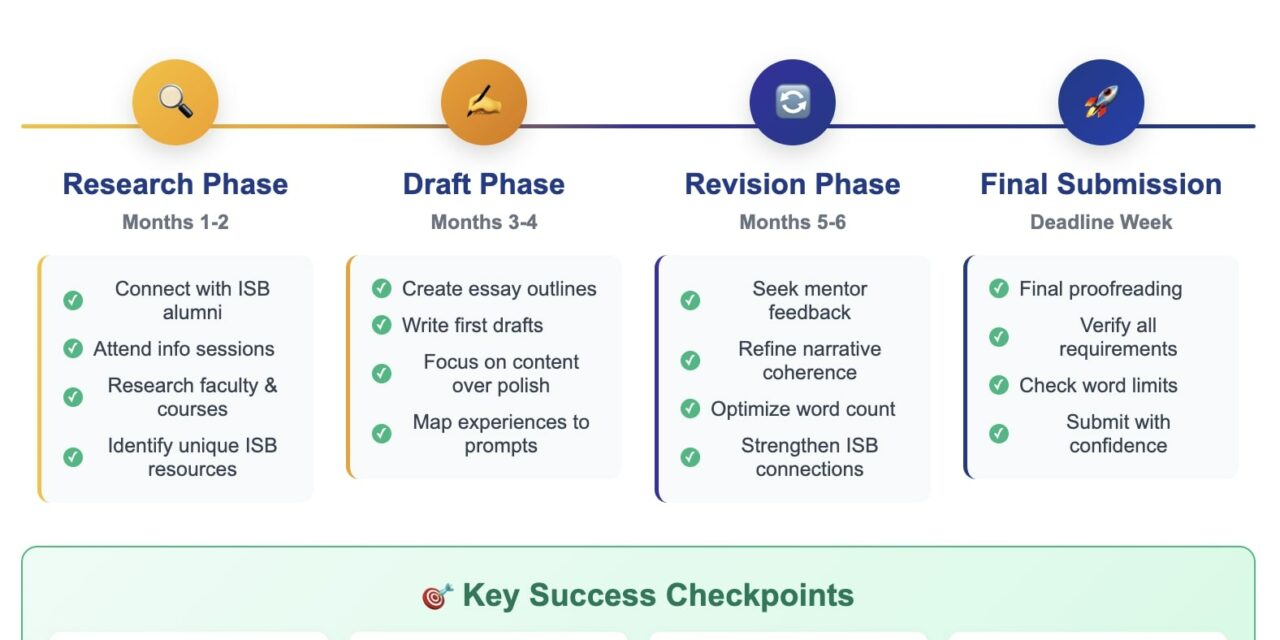The Indian School of Business (ISB) stands as one of Asia’s most prestigious MBA programs, consistently ranking among the world’s top business schools. For the Class of 2027, you’re not just competing against thousands of high-achieving professionals—you’re vying for a spot in a program that has produced CEOs, entrepreneurs, and industry leaders across the globe.
Here’s the reality: Your GMAT score and work experience get you in the door, but your essays determine whether you’ll receive that coveted admission offer. With thousands of applicants sharing similar credentials, your essays become your primary differentiator.
What makes this even more challenging? ISB’s one-year Post Graduate Programme (PGP) demands candidates who are laser-focused on their career trajectory and can articulate exactly how ISB fits into their professional journey.
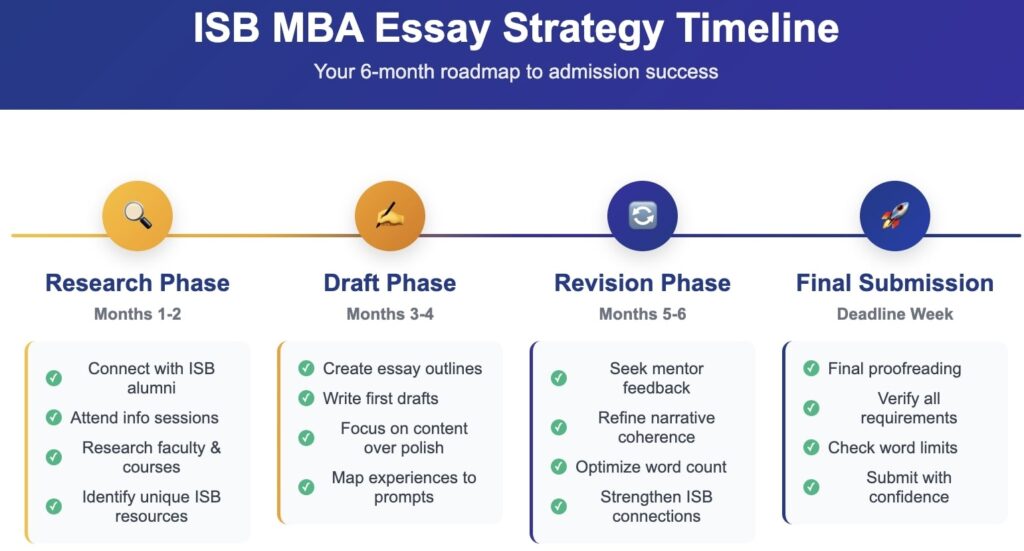
BOOST YOUR GMAT SCORE FOR ISB
Before crafting your essays, ensure your GMAT score opens doors at ISB. Get 400+ free practice questions, video lessons, and a full-length adaptive mock test. Start your free GMAT prep trial today.
- What Makes ISB Essays Different from Other MBA Programs
- Decoding ISB’s 2025-2026 Essay Prompts
- Essays Matter. But GMAT Opens the Door.
- Mastering the Word Count Challenge
- Three Profile Deep Dives: Learning from Successful ISB Candidates
- Demonstrating ISB Cultural Fit
- Researching ISB’s Unique Ecosystem
- Your Strategic Essay Framework
- Common Pitfalls and How to Avoid Them
- Your Action Plan for Success
- Your ISB Journey Starts Now
- Frequently Asked Questions about ISB MBA Program:
What Makes ISB Essays Different from Other MBA Programs
Unlike traditional two-year MBA programs, ISB’s essays are designed with unique characteristics that demand a specific approach:
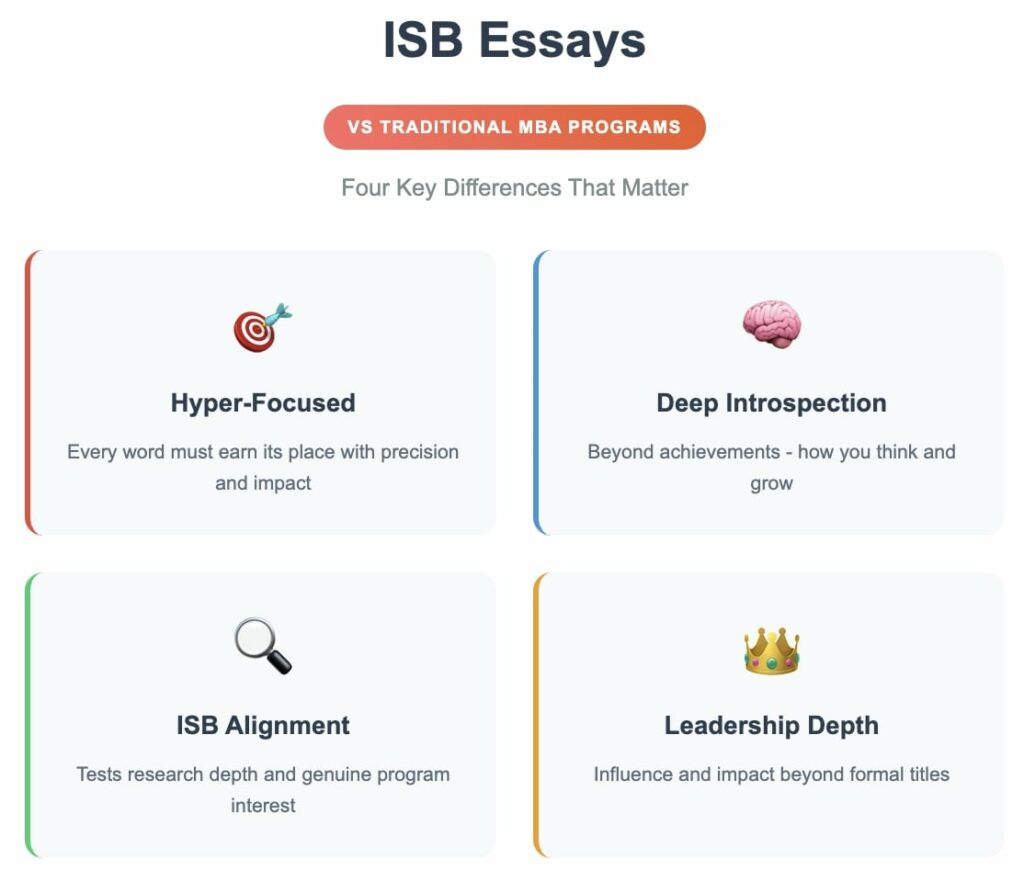
Decoding ISB’s 2025-2026 Essay Prompts
Essay 1: Your Personal Journey (Mandatory – 400 words)
Prompt: “Contemplate situations that have shaped your personal journey. Present what these situations have taught you about your strengths and weaknesses, and how they have shaped your personal and professional journey.”
What Admissions Really Wants: This isn’t a career timeline—it’s a character study. They want to understand your emotional intelligence, resilience, and capacity for growth.
| Category | Key Elements |
| ✅ Success Formula | Specific pivotal moments that revealed something about your character Honest self-assessment of both strengths and areas for improvement Learning mindset demonstrated through evolution from these experiences Professional impact of personal growth on your career trajectory |
| ❌ Common Mistakes to Avoid | Listing achievements instead of exploring growth Choosing situations that don’t reveal meaningful insights Focusing only on professional experiences Avoiding discussion of genuine weaknesses or failures |
Essay 2: Your Approach to Learning (Mandatory – 400 words)
Prompt: “What intellectual experiences have influenced your approach to learning and have led you to pursue an MBA? Please describe using anecdotes from your own experiences.”
What Admissions Really Wants: Your intellectual DNA and learning agility. They want to see natural curiosity and ability to thrive in ISB’s intensive environment.
| Category | Key Elements |
| ✅ Success Formula | Specific learning experiences that shaped your thinking (beyond formal education) Intellectual curiosity beyond your professional requirements Connection to MBA timing showing why now is the right moment Learning methodology that demonstrates ISB readiness |
| ❌ Common Mistakes to Avoid | Generic “I want to be a leader” statements Focusing on formal education only Failing to connect learning experiences to MBA timing Missing the intellectual curiosity component |
Essays Matter. But GMAT Opens the Door.
Your ISB essays showcase your story. But a strong GMAT score (avg 720) gets you to the interview stage. Start with a personalized GMAT plan built for ISB targets.
How Long Do You Need
to Score 705?
Get a personalized study timeline
Based on your current level and target score
Know which section to prioritize
Quant, Verbal, or DI — see where to focus first
Define your target percentiles
Clear metrics for each section to hit your goal
Essay 3: Why ISB, Why Now? (Optional – 250 words)
Prompt: “Given your experience and aspirations, how do you plan to use the PGP at ISB to fulfill your professional goals?”
Reality Check: Despite being “optional,” this essay is essentially mandatory for serious candidates.
What Admissions Really Wants: Deep ISB knowledge and genuine enthusiasm for the community.
| Category | Key Elements |
| ✅ Success Formula | Deep ISB knowledge beyond surface-level research Specific resource mapping connecting ISB offerings to your goals Clear ROI articulation showing thoughtful career planning Genuine enthusiasm for the ISB community and experience |
| ❌ Common Mistakes to Avoid | Generic business school benefits Superficial ISB research Unrealistic or vague career goals Failing to demonstrate school-specific fit |
Mastering the Word Count Challenge
ISB’s strict word limits aren’t just constraints—they’re tests of your ability to communicate with executive-level clarity. In the business world, you’ll need to present complex ideas succinctly to busy stakeholders. Consider these limits as your first leadership challenge.
Three Profile Deep Dives: Learning from Successful ISB Candidates
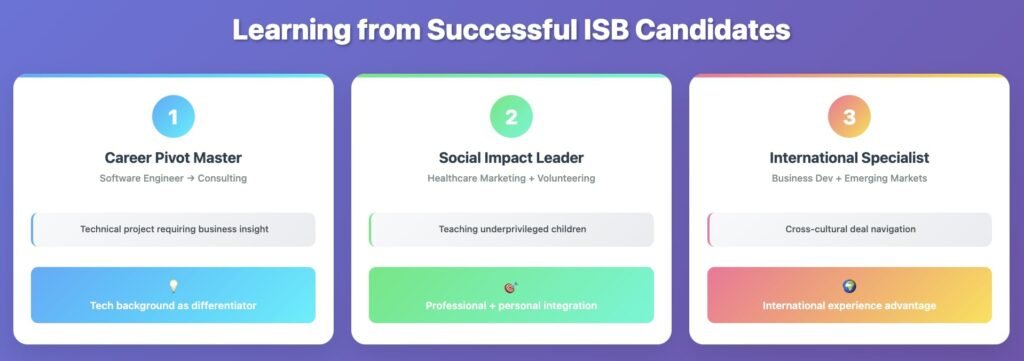
Success Story 1: The Career Pivot Master
Background: Software engineer transitioning to management consulting
Essay 1 Strategy: Focused on a challenging project where technical solutions required deep business understanding, revealing passion for strategic problem-solving beyond pure technical execution.
⭐ Key Takeaway: Used technical background as differentiator, not limitation.
Success Story 2: The Social Impact Leader
Background: Marketing professional in healthcare with volunteer leadership experience
Essay 1 Strategy: Described experience teaching underprivileged children, revealing passion for inclusive growth and communication skills.
⭐ Key Takeaway: Integrated professional and personal passions coherently.
Success Story 3: The International Expansion Specialist
Background: Business development professional with emerging markets experience
Essay 1 Strategy: Shared experience navigating cultural differences in international deals, highlighting adaptability and cross-cultural communication.
⭐ Key Takeaway: Leveraged international experience as core differentiator.
Demonstrating ISB Cultural Fit
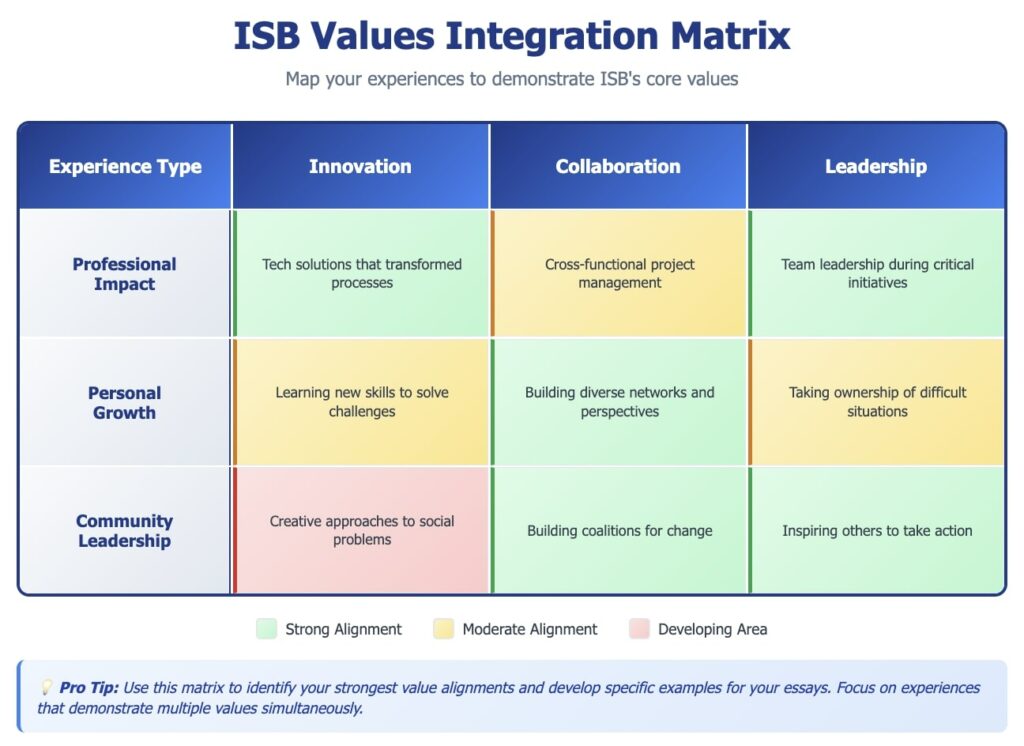
ISB’s Core Values and How to Showcase Them
Passion for Excellence: Beyond Performance Metrics
ISB seeks candidates who don’t just meet standards—they redefine them. This value encompasses four key dimensions:
- Demonstrated through consistent high performance
- Innovation and creative problem-solving
- Recognition and development of excellence in others
- Continuous improvement mindset
Openness: The Global Mindset ISB Values
Given ISB’s diverse, international environment, openness is crucial for success:
- Transparent communication and feedback
- Embracing diverse perspectives and ideas
- Information sharing and collaborative approach
- Adaptability to change and new environments
Caring Organisation: Leadership with Heart
ISB values leaders who achieve results while caring for their people and communities:
- Positive influence on team members and communities
- Recognition and appreciation of others’ contributions
- Shared success and collaborative achievement
- Social responsibility and ethical leadership
Researching ISB’s Unique Ecosystem
Academic Specializations: Going Beyond the Obvious
| Specialization | Strategic Positioning |
| Finance and Financial Markets | Connect to ISB’s strong industry relationships with major financial institutions Reference the school’s proximity to India’s financial capital, Mumbai Mention specific faculty research in emerging markets finance |
| Entrepreneurship and Family Business | Highlight ISB’s unique focus on family business dynamics in India Connect to the school’s strong startup ecosystem and incubation support Reference successful entrepreneur alumni and their ventures |
| Information Technology Management | Link to India’s position as a global IT hub Connect to ISB’s research in digital transformation and emerging technologies Reference partnerships with major tech companies |
Experiential Learning: The ISB Advantage
| Program | Understanding & Application |
| Business Design Lab (iDEAS) | Understand this as ISB’s innovation incubator for student projects Position it as a bridge between classroom learning and real-world application Connect to your entrepreneurial or innovation goals |
| Innovation Lab (PiVOT) | Recognize this as ISB’s platform for venture creation Link to your startup aspirations or intrapreneurial goals Understand its role in ISB’s entrepreneurship ecosystem |
| Industry Immersion Projects | See these as opportunities for hands-on consulting experience Connect to your desire for practical application of business concepts Link to your target industry or functional area |
| Corporate Consulting Projects | Understand these as real client engagements with measurable impact Position as opportunities to apply classroom learning to actual business challenges Connect to your consulting or strategic planning aspirations |
Faculty Research Alignment
| Research Area | Strategic Application |
| Specific Faculty Connections | Research professors whose work aligns with your interests Reference their recent papers or industry contributions Show how their expertise connects to your career goals |
| Industry Connections | Highlight ISB’s relationships with major corporations Connect to internship and placement opportunities Reference specific company partnerships relevant to your goals |
Your Strategic Essay Framework
Creating a Cohesive Narrative
Your three essays should function as chapters in a single story:
- Essay 1: The Foundation – Establishes character, values, and growth mindset.
- Essay 2: The Development – Shows intellectual evolution leading to MBA pursuit.
- Essay 3: The Application – Demonstrates how ISB enables your next chapter.
Addressing Potential Weaknesses Strategically
| Concern Type | Strategy |
| Academic Concerns | Use Essay 2 to highlight intellectual growth and learning experiences. |
| Industry Experience Gaps | Essay 1 can showcase transferable skills while Essay 3 articulates transition strategy. |
| Leadership Experience | Highlight informal influence, thought leadership, or community impact. |
| International Exposure | Emphasize cultural adaptability, language skills, or virtual collaboration. |
Common Pitfalls and How to Avoid Them
| Essay | ✅ Do This | ❌ Avoid |
| Essay 1 Pitfalls | Share specific situations that revealed genuine insights about your character. | “My biggest strength is leadership, and my weakness is perfectionism.” |
| Essay 2 Pitfalls | Describe unique intellectual experiences that shaped your thinking approach. | “I learned teamwork from playing cricket in college.” |
| Essay 3 Pitfalls | Mention specific faculty members, courses, and how they align with your goals. | “ISB has world-class faculty and great networking opportunities.” |
Your Action Plan for Success
Immediate Actions (Next 48 Hours):
- Download the complete ISB application
- Set up your essay drafting timeline
- Begin brainstorming experiences for each prompt
Research Phase (Next 2 Weeks):
- Connect with current ISB students or recent alumni
- Attend ISB information sessions or webinars
- Research specific faculty members and their expertise
- Identify 3-5 ISB resources that align with your goals
Writing Phase (Following 4-6 Weeks):
- Create detailed outlines for each essay
- Write first drafts focusing on content over polish
- Ensure each essay addresses the specific prompt requirements
- Seek feedback from trusted mentors or advisors
Final Phase (Last 2-3 Weeks):
- Revise for clarity, impact, and word count compliance
- Ensure coherent narrative across all essays
- Proofread meticulously for errors
- Verify all claims can be substantiated
Your ISB Journey Starts Now
Remember: ISB’s admissions committee reviews thousands of applications from accomplished professionals. Your essays transform statistics into stories, credentials into character, and achievements into aspirations.
Key Success Factors:
- Authenticity Over Perfection: ISB values genuine stories over polished narratives.
- Specificity Over Generality: Support every claim with concrete examples.
- Research Depth Over Surface Knowledge: Demonstrate insider-level understanding of ISB.
- Strategic Coherence Over Random Excellence: Tell a cohesive story across all essays.
- Future Focus Over Past Glory: Connect every experience to your post-ISB potential.
The ISB PGP isn’t just about advancing your career—it’s about amplifying your impact. Use these essays to show not just what you’ve done, but what you’re capable of becoming.
Your future self, the ISB community, and the broader business world are waiting to see what unique value you’ll contribute. Start writing. Your ISB journey begins now.
CREATE YOUR STRATEGIC GMAT TIMELINE
While perfecting your ISB essays, don’t let GMAT prep fall behind. Get a personalized study plan that fits your schedule and target score in just 10 minutes. Create your free study plan now.
Frequently Asked Questions about ISB MBA Program:
No, you cannot apply to ISB’s flagship PGP program without a GMAT score. ISB requires either a valid GMAT, GRE, or GMAC Executive Assessment score for admission to the Post Graduate Programme in Management. All scores must be from test centers only – starting from 2024-25, ISB no longer accepts at-home or online versions.
Additionally, you need 24+ months of work experience as of March 31st. However, ISB previously accepted CAT scores for the PGP YL (Young Leaders) program, though this program has been discontinued as of July 2024. For detailed information about score requirements, check out the GMAT score requirements section.
ISB does not accept CAT scores for its flagship PGP program. GMAT or GRE scores are mandatory for the main MBA program. However, ISB previously accepted CAT scores for the PGP YL (Young Leaders Program), which was designed for recent graduates or professionals with up to two years of work experience.
Unfortunately, as of July 1st, 2024, ISB has discontinued both the PGP YL and EEO programs. For the main PGP program, you must have a valid GMAT or GRE score from a test center to be eligible for admission. Learn more about the current CAT score acceptance policy and alternative requirements.
The ISB MBA program costs ₹42,13,000 (plus GST) for 2024-25. This comprehensive fee covers admission, tuition, course materials, and board & lodging.
Additional costs include:
Accommodation options: shared accommodation at ₹2,89,000 or studio accommodation at ₹5,16,000
Refundable security deposit of ₹20,000
Alumni association membership fee
The total program cost ranges from approximately ₹32-35 lakhs depending on your accommodation choice and other expenses, with the complete one-year MBA program totaling around 35.2 lakhs. For a detailed breakdown, visit the MBA cost breakdown section.
CAT is generally considered tougher than GMAT for several reasons:
CAT challenges:
Doesn’t adapt to individual capabilities – everyone answers the same questions
Only 40 minutes per section compared to GMAT’s 45 minutes
Broad, undefined syllabus
Conducted only once yearly
GMAT advantages:
Computer-adaptive format adjusting difficulty based on performance
Clearly defined syllabus and question types
Year-round availability for flexibility
The quantitative section of CAT is relatively more difficult than GMAT. However, the difficulty ultimately depends on individual strengths and preparation approach. For a comprehensive analysis, read our GMAT vs CAT comparison guide.
ISB has achieved impressive highest salary packages in recent years. The highest accepted CTC stood at ₹60 LPA for the 2023 batch, while a remarkable ₹2 crore package was offered by HiLabs to a woman candidate.
Additionally, 80% of the PGP batch 2024 received packages exceeding ₹35 LPA. The highest packages typically come from:
Top consulting firms like McKinsey, Bain & Company, and BCG
Leading technology companies
These exceptional outcomes reflect ISB’s strong industry connections and the caliber of its graduates. For detailed information, check our placement statistics section.
The average CTC after ISB MBA stands at ₹34.21 lakhs per annum, representing a 2.5X increase from the average pre-ISB CTC of ₹13.39 lakhs. For 2024 placements, the average package was ₹32.5 LPA.
Key placement highlights:
ISB Placements 2023: 222 recruiters made 1,578 offers
2024 placements: 405 companies registered, presenting 1,208 job offers
Top recruiting sectors: Consulting, Technology, Finance, and BFSI
Consulting firms typically offer the highest packages among all sectors. For comprehensive data, visit our average salary outcomes section.
ISB primarily offers a 1-year MBA program, but previously had a 2-year option. The main PGP program is 12 months long, starting in April with orientation and graduating in April.
ISB previously offered the PGP YL (Young Leaders Program), a 20-month course designed for recent graduates or professionals with up to two years of work experience. However, as of July 1st, 2024, ISB has discontinued both the PGP YL and EEO programs.
Further announcements regarding admission processes for programs targeting less experienced candidates are awaited. Learn more about current program structure options.
A safe GMAT score for ISB admission is 730+ to lead the pack and secure interview invitations with strong credibility. You should aim for at least 700 to reach the interview stage.
Score benchmarks:
Average GMAT score: 720 (Classic) or 665 (Focus Equivalent)
Successful applicants typically score: 680-750
Average GRE score: 330
Most successful applicants fall within the 680-750 range based on previous scoring systems. These scores provide competitive positioning for ISB’s highly selective admission process. For detailed guidance, check our safe scores for admission requirements.
ISB’s main PGP program does not accept freshers. You must have 24+ months of work experience as of March 31st to apply for the Post Graduate Programme in Management.
ISB previously offered programs for freshers including:
PGP YL (Young Leaders Program): for candidates with 0-24 months of experience
EEO (Early Entry Option): for those with less than 2 years of experience
However, as of July 1st, 2024, ISB has discontinued both programs. Further announcements regarding admission processes for freshers are still awaited. For current requirements, visit our work experience requirements section.
ISB MBA is primarily a 1-year program. The Full Time MBA program lasts 12 months, starting in April with orientation week and graduating in April. This intensive, full-time residential program covers all essential MBA components in a condensed timeframe.
Alternative executive programs include:
PGPMAX: 15-month Executive MBA
PGPpro: For working professionals
MFAB: 15-month program for family business professionals
The unique 1-year format offers faster career progression and lower opportunity cost compared to traditional 2-year programs, distinguishing ISB among Indian B-schools. For complete details, explore our program duration details section.


